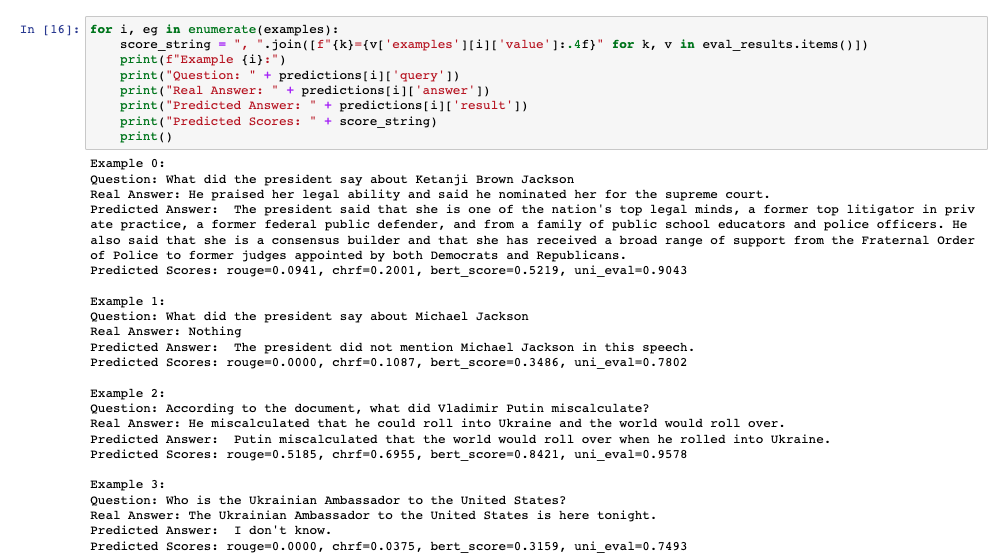The Python `wikipedia` package gives easy access for searching and
fetching pages from Wikipedia, see https://pypi.org/project/wikipedia/.
It can serve as an additional search and retrieval tool, like the
existing Google and SerpAPI helpers, for both chains and agents.
First of all, big kudos on what you guys are doing, langchain is
enabling some really amazing usecases and I'm having lot's of fun
playing around with it. It's really cool how many data sources it
supports out of the box.
However, I noticed some limitations of the current `GitbookLoader` which
this PR adresses:
The main change is that I added an optional `base_url` arg to
`GitbookLoader`. This enables use cases where one wants to crawl docs
from a start page other than the index page, e.g., the following call
would scrape all pages that are reachable via nav bar links from
"https://docs.zenml.io/v/0.35.0":
```python
GitbookLoader(
web_page="https://docs.zenml.io/v/0.35.0",
load_all_paths=True,
base_url="https://docs.zenml.io",
)
```
Previously, this would fail because relative links would be of the form
`/v/0.35.0/...` and the full link URLs would become
`docs.zenml.io/v/0.35.0/v/0.35.0/...`.
I also fixed another issue of the `GitbookLoader` where the link URLs
were constructed incorrectly as `website//relative_url` if the provided
`web_page` had a trailing slash.
This PR adds additional evaluation metrics for data-augmented QA,
resulting in a report like this at the end of the notebook:

The score calculation is based on the
[Critique](https://docs.inspiredco.ai/critique/) toolkit, an API-based
toolkit (like OpenAI) that has minimal dependencies, so it should be
easy for people to run if they choose.
The code could further be simplified by actually adding a chain that
calls Critique directly, but that probably should be saved for another
PR if necessary. Any comments or change requests are welcome!
# Problem
The ChromaDB vecstore only supported local connection. There was no way
to use a chromadb server.
# Fix
Added `client_settings` as Chroma attribute.
# Usage
```
from chromadb.config import Settings
from langchain.vectorstores import Chroma
chroma_settings = Settings(chroma_api_impl="rest",
chroma_server_host="localhost",
chroma_server_http_port="80")
docsearch = Chroma.from_documents(chunks, embeddings, metadatas=metadatas, client_settings=chroma_settings, collection_name=COLLECTION_NAME)
```
Resolves https://github.com/hwchase17/langchain/issues/1510
### Problem
When loading S3 Objects with `/` in the object key (eg.
`folder/some-document.txt`) using `S3FileLoader`, the objects are
downloaded into a temporary directory and saved as a file.
This errors out when the parent directory does not exist within the
temporary directory.
See
https://github.com/hwchase17/langchain/issues/1510#issuecomment-1459583696
on how to reproduce this bug
### What this pr does
Creates parent directories based on object key.
This also works with deeply nested keys:
`folder/subfolder/some-document.txt`
This pull request proposes an update to the Lightweight wrapper
library's documentation. The current documentation provides an example
of how to use the library's requests.run method, as follows:
requests.run("https://www.google.com"). However, this example does not
work for the 0.0.102 version of the library.
Testing:
The changes have been tested locally to ensure they are working as
intended.
Thank you for considering this pull request.
Solves https://github.com/hwchase17/langchain/issues/1412
Currently `OpenAIChat` inherits the way it calculates the number of
tokens, `get_num_token`, from `BaseLLM`.
In the other hand `OpenAI` inherits from `BaseOpenAI`.
`BaseOpenAI` and `BaseLLM` uses different methodologies for doing this.
The first relies on `tiktoken` while the second on `GPT2TokenizerFast`.
The motivation of this PR is:
1. Bring consistency about the way of calculating number of tokens
`get_num_token` to the `OpenAI` family, regardless of `Chat` vs `non
Chat` scenarios.
2. Give preference to the `tiktoken` method as it's serverless friendly.
It doesn't require downloading models which might make it incompatible
with `readonly` filesystems.
Fix an issue that occurs when using OpenAIChat for llm_math, refer to
the code style of the "Final Answer:" in Mrkl。 the reason is I found a
issue when I try OpenAIChat for llm_math, when I try the question in
Chinese, the model generate the format like "\n\nQuestion: What is the
square of 29?\nAnswer: 841", it translate the question first , then
answer. below is my snapshot:
<img width="945" alt="snapshot"
src="https://user-images.githubusercontent.com/82029664/222642193-10ecca77-db7b-4759-bc46-32a8f8ddc48f.png">
Hello! Thank you for the amazing library you've created!
While following the tutorial at [the link(`Using an example
selector`)](https://langchain.readthedocs.io/en/latest/modules/prompts/examples/few_shot_examples.html#using-an-example-selector),
I noticed that passing Chroma as an argument to from_examples results in
a type hint error.
Error message(mypy):
```
Argument 3 to "from_examples" of "SemanticSimilarityExampleSelector" has incompatible type "Type[Chroma]"; expected "VectorStore" [arg-type]mypy(error)
```
This pull request fixes the type hint and allows the VectorStore class
to be specified as an argument.
Different PDF libraries have different strengths and weaknesses. PyMuPDF
does a good job at extracting the most amount of content from the doc,
regardless of the source quality, extremely fast (especially compared to
Unstructured).
https://pymupdf.readthedocs.io/en/latest/index.html
- Added instructions on setting up self hosted searx
- Add notebook example with agent
- Use `localhost:8888` as example url to stay consistent since public
instances are not really usable.
Co-authored-by: blob42 <spike@w530>